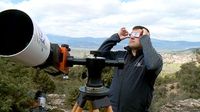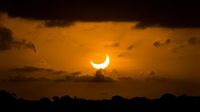Spain is gearing up for a fascinating astronomical event this Saturday, March 29, 2025, as the country prepares to witness a partial solar eclipse. This celestial phenomenon, where the Moon will obscure a portion of the Sun, is expected to provide a unique spectacle, with some regions in the northwest of the Iberian Peninsula experiencing an occultation of over 40%. Although it won't reach the grandeur of a total eclipse, this event offers a rare opportunity to connect with the cosmos and marvel at the precision of celestial movements.
According to the Geographical Institute of Spain (IGN), the eclipse will be visible across the entire Iberian Peninsula, beginning around 10:30 AM (Spanish peninsular time) and peaking between 11:30 AM and 12:00 PM, with slight variations depending on the location. The Balearic and Canary Islands will also enjoy the event, albeit with a lesser degree of obscuration. This partial eclipse serves as an exciting precursor to the total solar eclipse that will cross Spain in 2026, further heightening anticipation among astronomy enthusiasts and experts alike.
For those keen on experiencing the eclipse, many are already planning trips to prime locations to capture the best views and create unforgettable memories. Here are ten recommended spots across Spain, each offering a unique vantage point for the eclipse:
- Zamora: Mirador del Troncoso - Situated in the historic center of Zamora, this viewpoint offers clear views towards the eastern horizon, ideal for observing the eclipse. The event will begin around 10:41 AM, reaching its maximum at 11:39 AM, with approximately 25% of the Sun covered by the Moon.
- Albacete: Parque Periurbano de La Pulgosa - Located on the outskirts of Albacete, this park provides ample open spaces away from urban light pollution. The eclipse will start at 10:50 AM, peak at 11:39 AM, and conclude at 12:29 PM.
- Cáceres: Mirador de la Montaña - This viewpoint, located in the Sierra de la Mosca, offers panoramic views of Cáceres and its surroundings. The partial eclipse will be visible in the morning, with specific times available from official sources.
- Murcia: Observatorio Astronómico de Cabezo de la Jara - In Puerto Lumbreras, this observatory is one of the best spots in Murcia for stargazing due to its low light pollution. The eclipse will be visible during the morning, with exact timings provided by official sources.
- Santiago de Compostela: Monte Pedroso - This mountain provides a panoramic view of the city and clear skies towards the east. The eclipse will be visible in the morning, with specific times available from official sources.
- León: Alto del Portillo - Located just outside León, this high point offers a clear view of the eastern horizon. The eclipse will be visible in the morning, with specific times available from official sources.
- Madrid: Parque del Cerro del Tío Pío - Known for its 'Siete Tetas', this park in Vallecas offers one of the best panoramic views of Madrid. The eclipse will be visible in the morning, with specific times available from official sources.
- Barcelona: Búnkers del Carmel - This iconic viewpoint offers a 360-degree view of the city. The eclipse will be visible in the morning, with specific times available from official sources.
- Sevilla: Metropol Parasol (Las Setas) - This modern viewpoint in central Seville provides an elevated view of the city. The eclipse will be visible in the morning, with specific times available from official sources.
- Valencia: Parque de Cabecera - Located at the end of the old Turia riverbed, this park features extensive green areas and a lake. The eclipse will be visible in the morning, with specific times available from official sources.
As excitement builds for this partial eclipse, safety precautions for viewing are paramount. It is essential to never look directly at the Sun without appropriate protection, as solar radiation can cause irreversible damage to the retina, including blindness. Only use eclipse glasses certified to the ISO 12312-2 standard, specifically designed to filter harmful solar radiation. Ordinary sunglasses, X-rays, CDs, DVDs, or any homemade methods do not provide adequate protection and can damage your eyes.
For those who prefer indirect viewing, projecting the Sun's image onto a surface is a safe alternative. You can create a pinhole projector using a cardboard box and a white screen. If using telescopes or binoculars, ensure they are equipped with certified solar filters. Never observe the Sun through these instruments without the proper filters.
Planning and preparation are key to a successful viewing experience. Arrive early at your chosen observation spot to secure a good location and familiarize yourself with the surroundings. Check the weather forecast to avoid clouds that could obstruct your view of the eclipse, and be aware of the exact timings for your location to ensure you don't miss any moment of this celestial event. Sharing the experience with friends or participating in organized events by astronomy associations can make the experience even more rewarding.
Even with eclipse glasses, avoid looking at the Sun for extended periods. Take regular breaks to rest your eyes, supervise children during the eclipse, and ensure they follow safety recommendations. If you experience any discomfort in your eyes during or after viewing, consult an ophthalmologist. By following these guidelines, you can safely and memorably enjoy the partial solar eclipse this Saturday, March 29.
Looking ahead, the total solar eclipse on August 12, 2026, promises to be an even more spectacular event. The province of Burgos will be a prime location for viewing this phenomenon, as it will cross the entire province. Enrique Bordallo, president of Astroburgos, emphasizes the significance of this event, stating, "We are not aware of what this will mean. We have requests from all over the world to come and see it, and we cannot keep up." Hotels in Burgos are already fully booked for this event, with many accommodations reserved by international clients.
In Lerma, the Parador is fully booked by a group of Americans, while Hotel La Hacienda is also at capacity. Bodega Nabal in Gumiel de Izán is fully booked by around 100 North American photographers, who will arrive on August 11 for a rehearsal, including workshops and talks. This total eclipse will last for one minute and 44 seconds, a breathtaking experience that has drawn significant interest.
As the partial eclipse approaches, the excitement and anticipation continue to grow, marking a remarkable time for astronomy enthusiasts in Spain.





